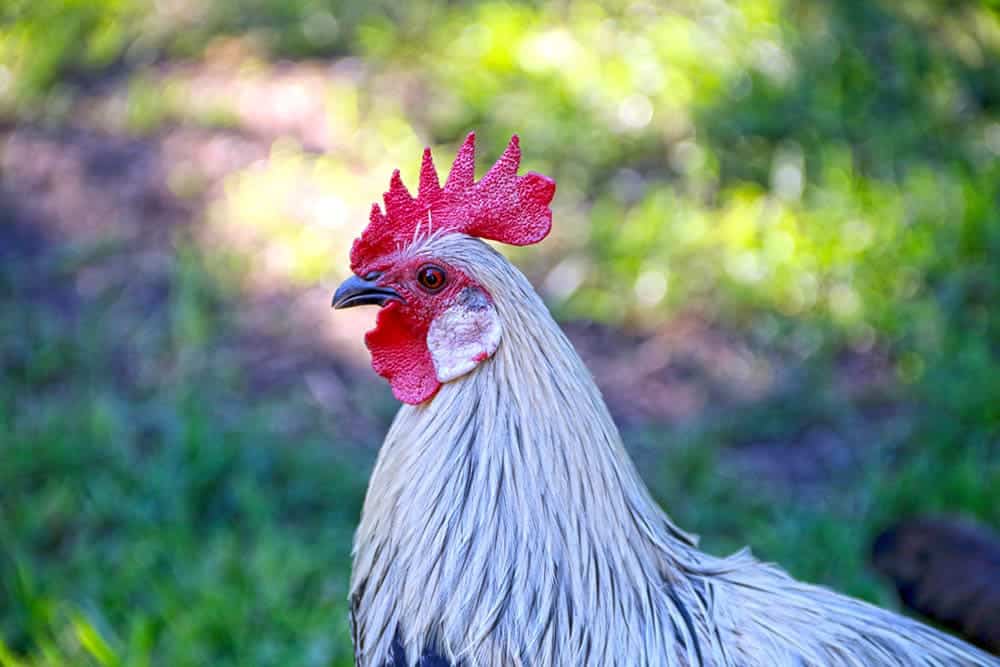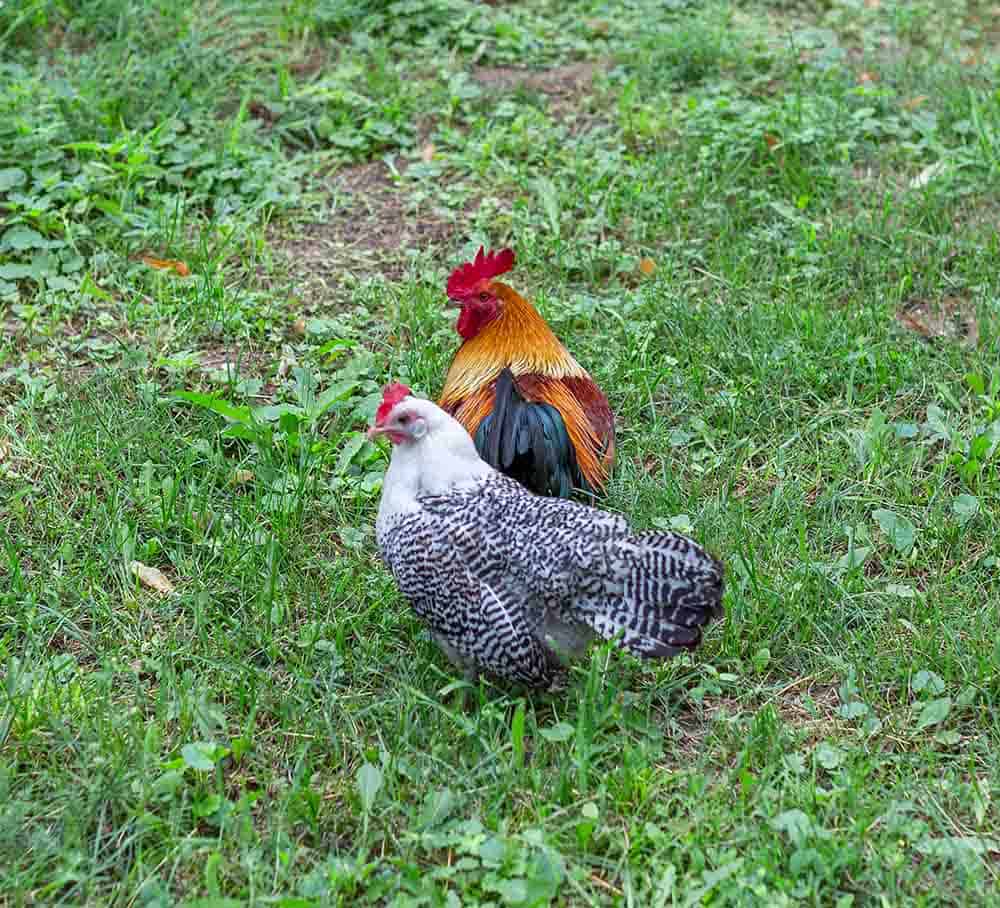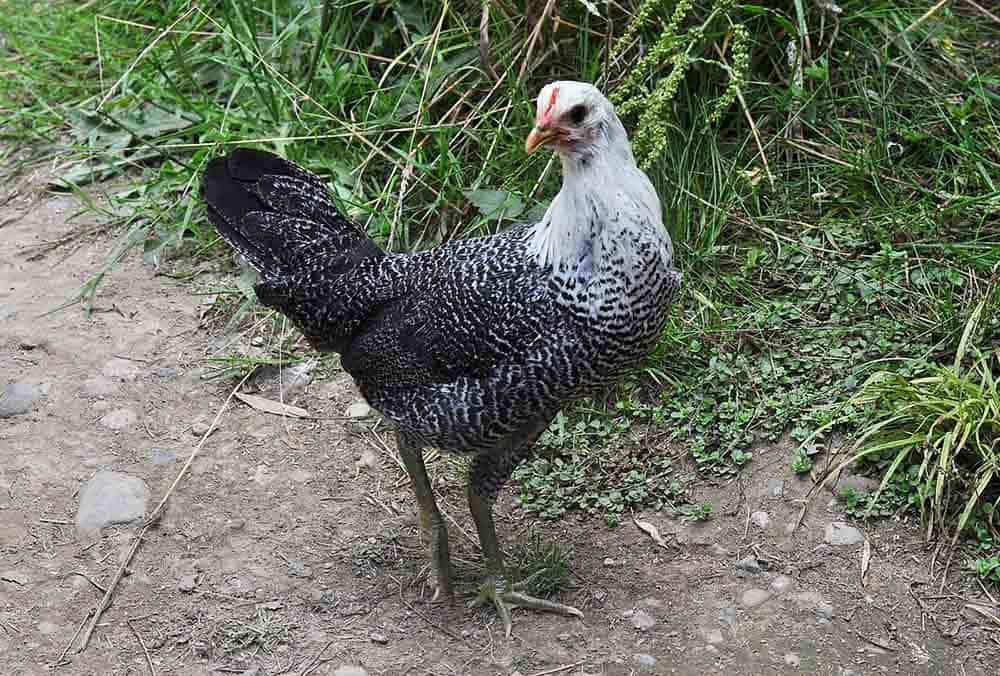The Egyptian Fayoumi chicken is a rarer breed, at least in America. Originating in Egypt, this chicken has only been in the states since the 1940s, but there aren’t many around. While beautiful, this breed can be a bit of work to handle, so they aren’t best for beginners. They are also better for those farms that allow free-ranging, as the birds dislike confinement. If you are interested in obtaining one, you’ll find they are decently good layers but aren’t great for meat due to their small size.
If you’re looking for an Egyptian Fayoumi chicken of your own, here’s what you need to know!

Quick Facts About the Egyptian Fayoumi Chicken
| Breed Name: | Egyptian Fayoumi |
| Other name(s): | Egypt |
| Uses: | Eggs |
| Rooster (Male) Size: | 3–4 lbs |
| Hen (Female) Size: | 2–3.5 lbs |
| Color: | Silver & black, silver & gray, silver & brown |
| Lifespan: | 5–8 years |
| Climate Tolerance: | Hot & warm |
| Care Level: | Moderate to expert |
| Production: | ~150 eggs per year |
Egyptian Fayoumi Chicken Origins
The Egyptian Fayoumi originated in—you guessed it—Egypt, approximately 62 miles outside of Cairo. The breed is believed to have been an ancient one, with many theorizing they came about in the early 1800s and were either introduced by a Turkish village or during the occupation of Napoleon. However, the breed didn’t appear in America until the early 1940s.
At that time, the Dean of Agriculture at Iowa State University brought Egyptian Fayoumi eggs back from Egypt to study them in the university’s poultry genetics program. Since then, the breed has grown in popularity in the States (although it’s still uncommon to find them there). They also still have not been recognized by the American Poultry Association.

Egyptian Fayoumi Chicken Characteristics
The Egyptian Fayoumi breed is an active one, known for its strong flying and escape artistry. If you bring one of these chickens home, you’ll need to have an extremely high fence or keep them enclosed somewhere until they are used to their new surroundings so as to prevent escape. You’ll also need to expect the bird’s dislike of being handled. This breed is not one to make a good pet; while they will tolerate people if needed, they very likely won’t let you pet them.
Despite their escape attempts, the Egyptian Fayoumi does best as a free-range chicken as they like their freedom and having space to roam about. In fact, letting them be free-range means they will be less expensive to keep as they can get most of their food from foraging. And as males are relatively tolerant of each other, there shouldn’t be much fighting among them as they go about their space.
These birds are also reasonably vocal. Not only will they sometimes scream if captured by a person, but they’ll also do their best to let you know if a predator is out and about.
Best of all, this breed is known for being fairly disease-resistant!
Uses
The Egyptian Fayoumi breed is raised mainly for their egg-laying production. Hens develop quicker than other breeds and are able to start laying by 4 months old, with the average laying production being about 150 eggs a year. Though on the smaller side, the eggs are lower in cholesterol than is the norm, making them a bit healthier. Because of their small size, the Egyptian Fayoumi isn’t really raised for meat.

Appearance & Varieties
The Egyptian Fayoumi is a beautiful bird that has white-silver feathers on the head and neck, with the rest of the body being black, grey, and occasionally brown. They start life with brown heads and bodies speckled with grey but develop their true colors as they age. They also have large, fluffy tails that stand nearly vertical; between that and the forward jutting breast, they look similar to roadrunners.
Their beaks and claws are the color of horn, while their skin is usually a slate blue. The breed has a six-pointed wattle that is red and medium-sized. They have large, dark eyes and amazing eyesight that helps them catch predators on the prowl, enabling them to escape and stay safe.
The Egyptian Fayoumi is also on the smaller side, only weighing 2–4 pounds.
Population & Distribution
You’ll find that the Egyptian Fayoumi is much more common in its homeland, Asia, and Europe than in the United States, so it may be difficult to acquire one. Though they are not as common in the U.S., they also aren’t listed on the Livestock Conservancy’s watch list, so there are plenty of them around elsewhere. You’ll also find they do better as free-range chickens than in confinement.
Are Egyptian Fayoumi Chickens Good for Small-Scale Farming?
The Egyptian Fayoumi probably isn’t the best for small-scale farming since they are harder to keep than most chickens and thrive the most when they have plenty of space to roam about. Plus, they aren’t very family-friendly (though they aren’t aggressive; they just prefer not to be handled). This chicken requires enough work that the pay-off is likely not worth it for small-scale farms.

Conclusion
The Egyptian Fayoumi chicken is gorgeous, but it’s also a fair amount of work to keep around. The breed is disease-resistant, which will save on vet bills, and they are good layers. But they are also not thrilled with having people around and are prone to attempting escape. The breed is also more difficult to locate in the United States.
However, if you do decide to try this breed out, you’ll need to ensure they have plenty of space to roam about—not only will the birds be happier, but you will be able to feed them less as they will get most of what they need from foraging.
Featured Image Credit: Cory’s_chickens_09_-_Egyptian_Fayoumi_pullet_(28488787120)(Joe Mabel, Wikimedia Commons CC SA 2.0 Generic)
